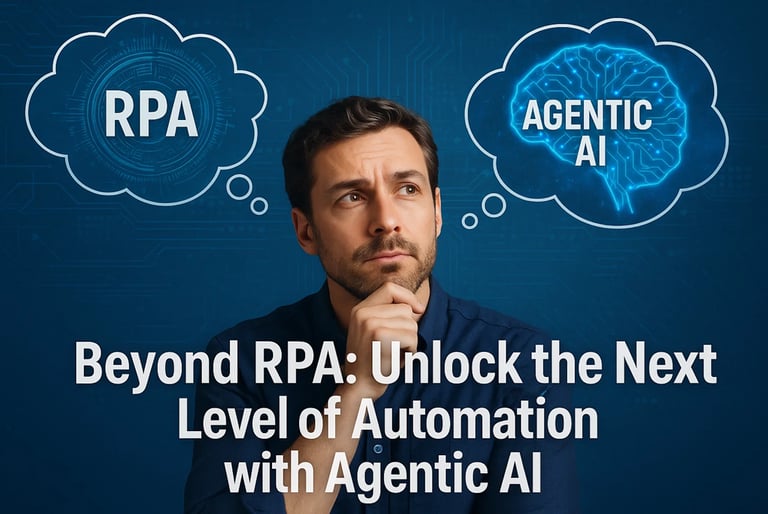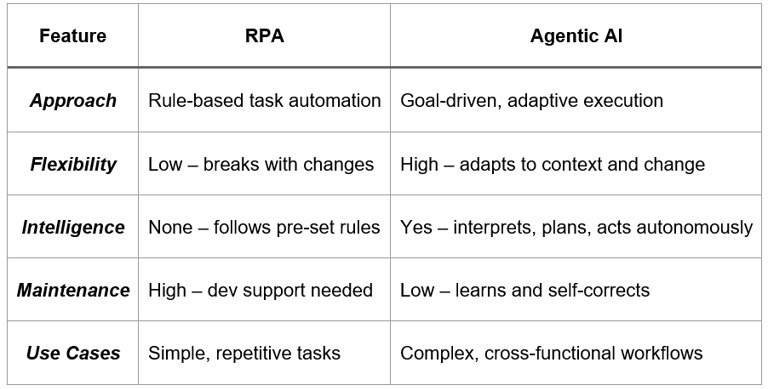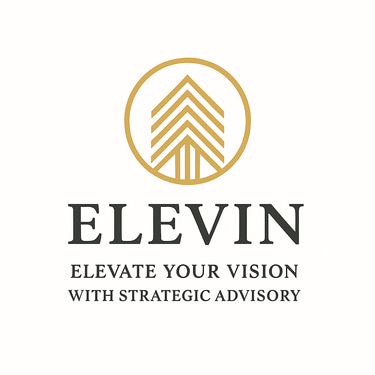Beyond RPA: Unlock the Next Level of Automation with Agentic AI
Discover why you, as a founder, CXO, or operations leader, must move beyond RPA to Agentic AI for smarter, adaptive automation that unlocks strategic advantage.)
Aishwarya K
7/27/20256 min read


Introduction
For years, Robotic Process Automation (RPA) has helped businesses streamline repetitive, rules-based tasks. It reduced manual work, improved accuracy, and freed up valuable time. But the pace of business has changed. It's faster, more complex, and constantly shifting. In this environment, static automation alone isn't enough.
That’s why leaders and founders are beginning to look beyond traditional automation.
According to Gartner, 79% of corporate strategists now consider AI essential to business success, especially for improving decision-making. The signal is clear: the next wave of automation isn’t just about doing tasks more efficiently. It’s about acting with intelligence, adapting in real time, and delivering outcomes that matter.
If you're a founder, CXO, CIO, CTO, or operations leader, it’s time to ask: What comes after RPA?
The answer lies in automation that goes beyond following rules. It understands context, adapts to change, and makes decisions autonomously. This is where Agentic AI comes in. It is designed to act with intent, respond to real-time data, and deliver outcomes, not just outputs.
In this blog, we’ll explore why Agentic AI is the next step in automation, how it expands what’s possible beyond RPA, and what it means for teams looking to cut through the noise, save time, and build with clarity and purpose.
The Limits of RPA: Why Traditional Automation Isn’t Enough Anymore
RPA was a game-changer when it entered the scene. By mimicking human actions across digital systems, it enabled teams to automate hundreds of hours of low-value work. You could trigger bots to update CRMs, transfer data between systems, or process invoices without human intervention.
However, as businesses scaled and workflows grew more complex, RPA’s cracks began to show.
Here are some of the most common limitations:
Rigid and Fragile: RPA bots are rule-following machines. Even a small change in UI, data format, or process logic can break them.
Maintenance-Heavy: Bots need constant upkeep. That often translates to ongoing dev cycles just to keep things running.
Lacks Intelligence: RPA doesn’t “understand” what it’s doing. It can’t make decisions, respond to exceptions, or optimize on the fly.
Stuck in Silos: Most bots are task-specific and can’t coordinate across systems or adapt based on broader business context.
In short, RPA is good at automating what was predictable, but it struggles when real-world variability, ambiguity, or growth enter the picture.
What Is Agentic AI and Why It’s Different
Agentic AI isn’t about automating steps. It’s about achieving outcomes.
Rather than mimicking human clicks, Agentic AI empowers autonomous agents. AI-powered systems that understand goals, create action plans, execute across multiple tools, and adapt on the fly. Think of them as intelligent teammates who never sleep, don’t burn out, and keep learning as they go.
At Elevin, we define Agentic AI as automation that can:
Interpret your goal
Break it into sub-tasks
Execute actions contextually across tools
Learn from feedback
Self-correct in real-time
Where RPA follows a script, Agentic AI writes and rewrites the script as needed.
RPA vs. Agentic AI: Key Differences


Real-World Applications: From Tasks to Thinking Agents
To see the leap, let’s compare how RPA and Agentic AI would handle real workflows:
Scenario 1: Recruitment Workflow
With RPA:
A bot pulls resumes from a specific inbox and uploads them into an Applicant Tracking System (ATS).
If the email subject line or attachment format changes, the process fails.With Agentic AI:
An agent scans multiple hiring platforms, screens resumes based on job-specific criteria, prioritizes qualified candidates, and flags anomalies like missing data.
It adapts its logic as new job roles, file types, or screening priorities emerge.
Scenario 2: Reporting
With RPA:
You auto-generate and email a weekly report at 9 a.m. every Monday.With Agentic AI:
The agent not only creates the report but also highlights outliers, correlates anomalies, suggests reasons behind variances, and recommends actions—before your morning meeting.
Scenario 3: Customer Onboarding
With RPA:
You trigger a sequence that populates a CRM and sends a welcome email.With Agentic AI:
The agent understands the customer profile, selects the right onboarding flow, personalizes touchpoints based on activity, and alerts your team if the user hasn’t engaged after three days.
Strategic Benefits for Founders, CXOs, and Ops Leaders
For founders, CXOs, and operations leaders, the shift from RPA to Agentic AI isn’t just a technological upgrade. It’s a strategic advantage. Where RPA is task-focused, Agentic AI is outcome-driven. It’s about equipping your team with digital agents that understand context, make decisions, and free up human bandwidth for higher-value work.
Here’s what that looks like in practice:
✅ Faster, Smarter Hiring:
With Agentic AI, one of our clients automated resume screening by deploying a digital agent that analyzes candidate profiles in real time, matches them against job descriptions, and scores them on a 0–100 scale. The result? A ranked shortlist delivered instantly, reducing manual screening time by 12+ hours per week and accelerating hiring cycles by up to 40%.
✅ Certifications Without the Chaos:
For training teams and edtech setups, repetitive certificate generation is a hidden time sink. With an Agentic AI-powered Certificate Generation Agent, businesses now auto-generate personalized certificates by pulling data from Google Sheets and sending real-time alerts to admins. This has translated into 60+ hours saved per month, a meaningful difference for lean ops teams.
✅ Accurate Marksheet Generation:
In academic or training contexts, Agentic AI helps remove manual errors by reading performance data and auto-generating marksheets directly from spreadsheets. This not only ensures accuracy and consistency but also leads to 15+ hours saved monthly, letting instructors and coordinators focus on learners—not logistics.
✅ Zero-Effort Contact Syncing:
For companies collecting business cards at student fairs, expos, or onboarding events, Agentic AI's OCR Contact Reader Agent scans contact info and automatically syncs it into the CRM—no human input needed. This improves lead hygiene and ensures zero follow-up delays, especially in fast-paced business development environments.
These are just a few examples of Agentic AI agents that are already transforming routine tasks into intelligent workflows, not by replacing people, but by augmenting them.
The strategic value?
More time for deep work. Faster turnaround on critical ops. Fewer errors. Better outcomes.
And importantly for founders, it means unlocking compound time savings without expanding headcount.
Why Now?
So why is Agentic AI suddenly viable?
Tool maturity: The explosion of APIs, SaaS tools, and no-code platforms means agents have more places to act.
Model performance: LLMs can now reason, reflect, and summarize complex contexts with high reliability.
Operational noise: Most teams are overwhelmed—not because they lack automation, but because their automation can’t think.
The modern business doesn’t need more dashboards or scripts. It needs clarity-first agents that reduce noise and surface signal. And if you're a startup still working toward product-market fit, that kind of focused insight can be the difference between scaling with confidence and guessing your next move.
A Mental Model Shift: From Automation to Augmentation
It’s not just about saving time anymore. It’s about how you make better decisions at scale.
Where traditional automation focused on speed, Agentic AI focuses on strategy.
Think of it this way:
RPA was built to do.
Agentic AI is built to decide, adapt, and improve.
If RPA was your digital assistant, Agentic AI is your digital operator, working toward outcomes, not just tasks.
Getting Started with Agentic AI
At Elevin Consulting, we specialize in building Clarity-First AgentOps Systems, i.e., intelligent automations designed to:
Reduce operational chaos
Boost team velocity
Unblock decision-makers
Scale workflows without scaling stress
We bring a systems-first, outcome-oriented approach to every engagement—ensuring that your Agentic AI initiatives don’t just “work,” but move the business.
Here’s what a typical AgentOps rollout at Elevin looks like:
Clarity Audit: Identify noisy, slow, or error-prone workflows across your ops.
Agent Design: Define what success looks like and where autonomous decision-making fits.
Tool Orchestration: Map the agent’s interaction layer across your stack (CRMs, Notion, Google Sheets, Slack, etc.).
Pilot + Feedback: Launch with one core use case. Track impact. Iterate.
Scale Horizontally: Add agents across teams, recruitment, finance, growth, product ops, and more.
Final Word: The Shift Is Already Happening
If you’re still relying entirely on RPA and manual ops, you’re likely losing hours (and dollars) every week.
The companies adopting Agentic AI today aren’t just more efficient—they’re more adaptive, more focused, and better equipped to handle what’s next.
Agentic AI isn’t the future. It’s the now.
Ready to Move Beyond RPA?
Whether you’re scaling a startup or leading operations at a fast-growing company, we can help you rethink automation from the ground up. We’re just a free discovery call away.
Yes, I want to see how Agentic AI can help me scale smarter
Let’s build clarity-first systems that help your team move faster, smarter, and with purpose.
Excellence
Elevin Consulting: Your Partner in Growth.
Impact
© 2025 Elevin Consulting Pvt Ltd. All Rights Reserved
Trust
hello@elevinconsulting.com
